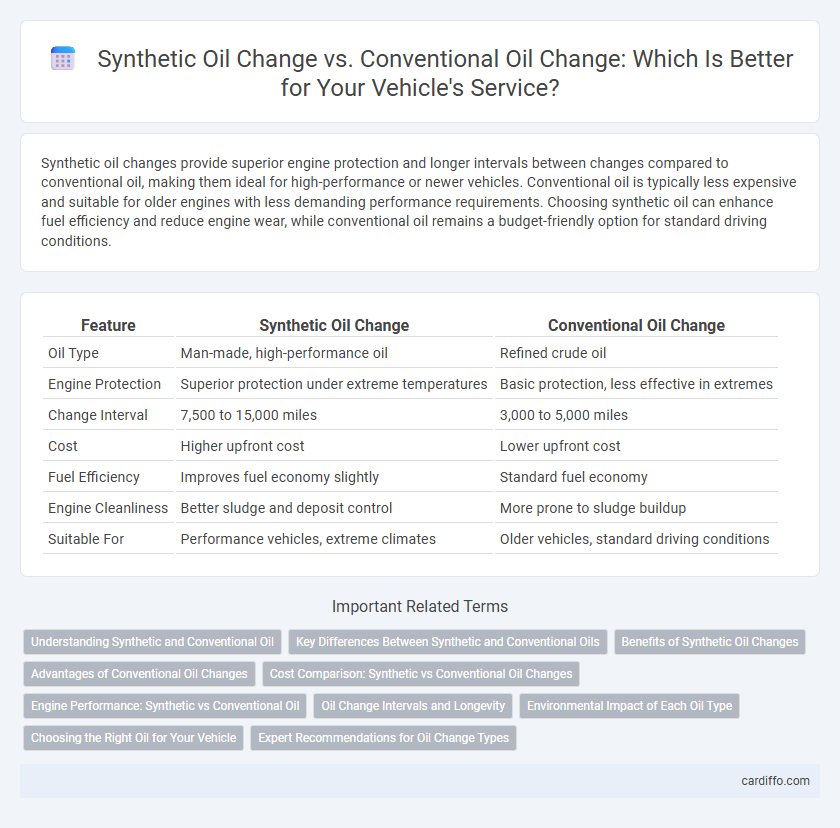Synthetic oil changes provide superior engine protection and longer intervals between changes compared to conventional oil, making them ideal for high-performance or newer vehicles. Conventional oil is typically less expensive and suitable for older engines with less demanding performance requirements. Choosing synthetic oil can enhance fuel efficiency and reduce engine wear, while conventional oil remains a budget-friendly option for standard driving conditions.
Table of Comparison
| Feature | Synthetic Oil Change | Conventional Oil Change |
|---|---|---|
| Oil Type | Man-made, high-performance oil | Refined crude oil |
| Engine Protection | Superior protection under extreme temperatures | Basic protection, less effective in extremes |
| Change Interval | 7,500 to 15,000 miles | 3,000 to 5,000 miles |
| Cost | Higher upfront cost | Lower upfront cost |
| Fuel Efficiency | Improves fuel economy slightly | Standard fuel economy |
| Engine Cleanliness | Better sludge and deposit control | More prone to sludge buildup |
| Suitable For | Performance vehicles, extreme climates | Older vehicles, standard driving conditions |
Understanding Synthetic and Conventional Oil
Synthetic oil is engineered with uniform molecular structures that offer enhanced lubrication, temperature stability, and resistance to oxidation compared to conventional oil, which is derived from refined crude oil with naturally occurring molecular inconsistencies. This advanced formulation in synthetic oil reduces engine wear, improves fuel efficiency, and extends oil change intervals, making it ideal for high-performance and modern vehicles. Conventional oil, while more affordable, requires more frequent changes and is best suited for older or low-mileage engines that operate under less demanding conditions.
Key Differences Between Synthetic and Conventional Oils
Synthetic oil is engineered with uniform molecular structures, offering superior engine protection, higher temperature resistance, and extended oil change intervals compared to conventional oil, which consists of naturally refined crude oil with varied molecules. Conventional oil provides adequate lubrication for standard driving conditions but breaks down faster under extreme temperatures and stress, leading to more frequent oil changes. The key differences include synthetic oil's enhanced viscosity stability, better oxidation resistance, and improved performance in both cold starts and high-heat environments, making it a preferred choice for modern engines requiring advanced protection.
Benefits of Synthetic Oil Changes
Synthetic oil changes offer superior engine protection by maintaining viscosity and resisting breakdown under extreme temperatures, thereby extending engine life. This type of oil enhances fuel efficiency due to its reduced friction properties, leading to cost savings and fewer emissions. Longer intervals between synthetic oil changes compared to conventional oil reduce overall maintenance frequency and increase convenience for vehicle owners.
Advantages of Conventional Oil Changes
Conventional oil changes offer cost-effective engine lubrication, making them an affordable maintenance option for many vehicles. This type of oil provides adequate protection for older engines and vehicles with low to moderate mileage, reducing wear and tear under normal driving conditions. Regular conventional oil changes help maintain engine cleanliness by preventing sludge buildup and ensuring consistent performance over time.
Cost Comparison: Synthetic vs Conventional Oil Changes
Synthetic oil changes typically cost between $65 and $85, while conventional oil changes range from $35 to $55, reflecting the higher price of synthetic oil. Synthetic oil offers longer intervals between changes, often 7,500 to 10,000 miles, compared to conventional oil's 3,000 to 5,000 miles, which may reduce the overall annual service cost. Despite a higher upfront cost, synthetic oil's enhanced protection and extended change intervals can result in better long-term value for many vehicles.
Engine Performance: Synthetic vs Conventional Oil
Synthetic oil enhances engine performance by providing superior lubrication, reducing friction, and maintaining stability under extreme temperatures, which extends engine life and improves fuel efficiency. Conventional oil offers basic protection but tends to break down faster under heat and stress, leading to increased engine wear and potential sludge buildup. Choosing synthetic oil optimizes engine cleanliness and efficiency, making it the preferred choice for high-performance and modern vehicles.
Oil Change Intervals and Longevity
Synthetic oil changes typically allow for longer oil change intervals, often ranging from 7,500 to 15,000 miles, compared to conventional oil which usually requires changes every 3,000 to 5,000 miles. The advanced formulation of synthetic oils enhances engine protection and reduces wear, contributing to improved engine longevity. Choosing synthetic oil can result in fewer oil changes over time, saving both time and maintenance costs while ensuring optimal engine performance.
Environmental Impact of Each Oil Type
Synthetic oil changes generate less environmental waste due to extended oil life, reducing the frequency of oil disposal compared to conventional oil changes. Synthetic oils often contain fewer impurities and additives that can harm ecosystems, leading to a lower ecological footprint during use and disposal. Conventional oils require more frequent changes, increasing oil consumption and the risk of environmental contamination from improper disposal.
Choosing the Right Oil for Your Vehicle
Selecting the right oil for your vehicle involves understanding the differences between synthetic oil change and conventional oil change options. Synthetic oil offers superior engine protection, enhanced performance in extreme temperatures, and longer intervals between changes compared to conventional oil. Considering your vehicle's make, model, and driving conditions ensures optimal engine maintenance and efficiency.
Expert Recommendations for Oil Change Types
Experts recommend synthetic oil changes for vehicles subjected to extreme temperatures or heavy-duty driving due to superior lubrication and longer intervals between changes. Conventional oil is preferred for older engines or vehicles with low mileage, as it provides adequate protection at a lower cost. Regular oil analysis and adherence to manufacturer guidelines ensure optimal engine performance and longevity regardless of the oil type used.
Synthetic Oil Change vs Conventional Oil Change Infographic

 cardiffo.com
cardiffo.com